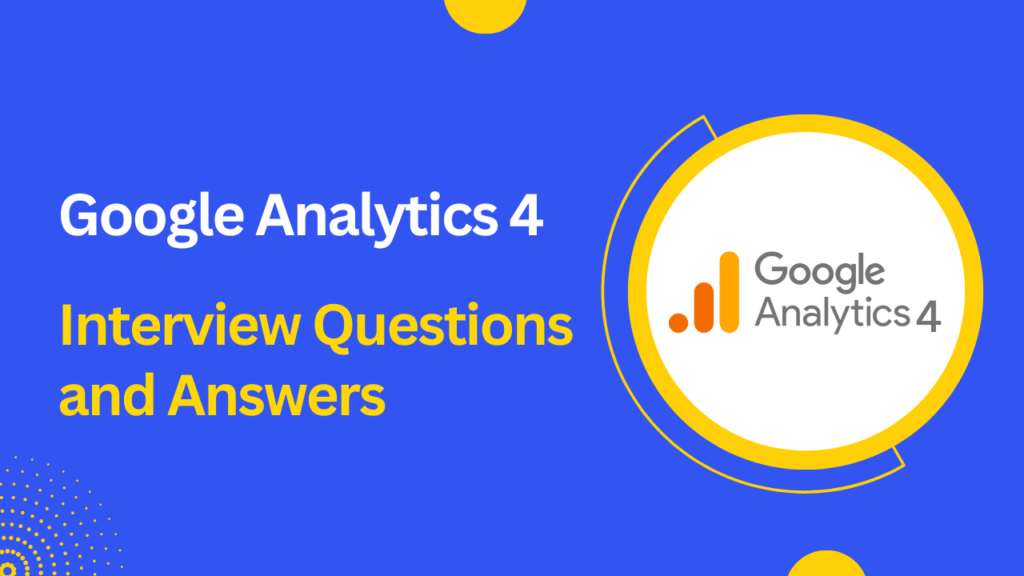Preparing for a Google Analytics interview and wondering which questions you should be ready with? Whether you are going for an SEO interview or a role in Web Analytics, being well-prepared for the Google Analytics 4 interview questions is crucial to showcase your expertise.
Google Analytics 4 (GA4) is a powerful web analytics platform that provides valuable insights into user behavior on websites and mobile apps. As employers seek professionals with expertise in GA4, it’s essential to be well-prepared for interviews. In this blog, we’ll explore the top 30 crucial Google Analytics 4 interview questions along with comprehensive answers to help you ace your next interview.

Top Google Analytics 4 Interview Questions and Answers
Question 1: What is Google Analytics 4?
Answer: Google Analytics 4 (GA4) is the latest version of Google’s web analytics platform. It offers advanced tracking and analysis capabilities for websites and mobile apps. GA4 uses an event-based data model, focusing on user interactions and engagement across various platforms to provide more comprehensive and accurate insights into user behavior.
Question 2: How is Google Analytics 4 different from Universal Analytics?
Answer: Google Analytics 4 differs from Universal Analytics in several ways. Unlike Universal Analytics, which primarily uses a pageview-based model, GA4 utilizes an event-based model, allowing for a deeper understanding of user actions beyond pageviews. GA4 also incorporates machine learning to deliver better predictions and analysis, making it a more powerful and future-oriented analytics solution for businesses with web and app properties.
Question 3: How do you set up Google Analytics 4 for a website?
Answer: To set up Google Analytics 4 for a website, the below steps need to be followed:
a) Create a new Google Analytics 4 property from the Google Analytics dashboard.
b) Obtain the GA4 Measurement ID.
c) Add the GA4 Measurement ID to the website’s HTML code using the gtag.js script or Google Tag Manager.
d) Test the implementation to ensure data tracking is working correctly.
Question 4: How to migrate from Universal Analytics to GA4?
Answer: Migrating from Universal Analytics to GA4 involves the following steps:
- Create a New GA4 Property: Set up a new property in Google Analytics 4 for your website or app.
- Obtain the GA4 Measurement ID: Find the Measurement ID from the GA4 property settings.
- Update Tracking Code: Replace the Universal Analytics tracking code on your website or app with the GA4 Measurement ID using gtag.js or Google Tag Manager.
- Data Import (Optional): Consider importing historical data from Universal Analytics to GA4 for continuity and historical analysis.
- Verify and Test: Verify the GA4 implementation and test the data collection to ensure accuracy.
- Implement Enhanced Tracking: Utilize recommended events and enhanced measurement for comprehensive user tracking.
- Monitor and Analyze: Keep a close eye on the data in both Universal Analytics and GA4 during the transition phase to ensure data integrity.
Question 5: How can you track conversions and goals in Google Analytics 4?
Answer: In GA4, conversions and goals are tracked using events. Define specific user interactions as conversion events, such as form submissions, sign-ups, or purchases. Create custom events and set them as goals to monitor user behavior aligned with your business objectives. Use the Conversion report to analyze goal completions and optimize your website or app to drive desired actions.
Question 6: What are events in Google Analytics 4, and how are they different from pageviews?
Answer: In GA4, events are user interactions with content on a website or app, such as clicks, form submissions, video plays, etc. They offer more detailed insights into user engagement compared to pageviews, which only track when a page is viewed. Events provide data on specific actions taken by users, allowing marketers to analyze user behavior and optimize their strategies accordingly.
Question 7: What are the different types of events in Google Analytics 4?
Answer: In Google Analytics 4, events are categorized into four types:
a) Automatically Collected Events: These are basic interactions automatically tracked by GA4, like pageviews and first visits.
b) Recommended Events: Predefined events suggested by GA4 based on best practices, such as scroll tracking and video engagement.
c) Enhanced Measurement Events: Events automatically tracked when enhanced measurement is enabled, including file downloads and outbound clicks.
d) Custom Events: Events that you define and implement on specific user interactions relevant to your business, like form submissions or button clicks.
Question 8: What are user properties in Google Analytics 4, and how do they help in audience segmentation?
Answer: User properties in GA4 are attributes that provide additional information about users, such as age, gender, interests, etc. They aid in audience segmentation by allowing marketers to categorize users based on shared attributes. This segmentation helps businesses understand their target audience better, personalize marketing campaigns, and deliver relevant content to different user groups.
Question 9: How does Google Analytics 4 handle cross-domain tracking?
Answer: GA4 simplifies cross-domain tracking by using the global site tag (gtag.js) and automatically tracking users across different domains. There’s no need to set up complex configurations or modify the tracking code for each domain. GA4’s cross-domain tracking feature ensures that user interactions on different domains are attributed accurately to the same user.
Question 10: Explain how Google Analytics 4 handles data privacy and compliance.
Answer: GA4 is designed with data privacy and compliance in mind. It allows users to enable data collection settings to respect user consent preferences, such as GDPR and CCPA regulations. GA4 provides options to anonymize IP addresses, disable data sharing with Google, and manage data retention periods. This ensures that businesses can collect data ethically and in accordance with data protection laws.
Also Read: 50+ Must Read SEO Interview Questions and Answers in 2023
Question 11: How can you analyze user engagement and retention in Google Analytics 4?
Answer: GA4 offers user engagement and retention reports that help analyze user behavior over time. Key reports include:
a) Engagement: Provides insights into user interactions, such as session duration, bounce rates, and active users.
b) Retention: Measures user retention rates over specified time frames, revealing how many users return to the website or app.
c) User Explorer: Allows tracking individual user behavior, enabling a deeper understanding of user engagement patterns.
Question 12: How can you track in-app events in Google Analytics 4?
Answer: To track in-app events in GA4, integrate the Firebase SDK into your mobile app. Firebase Analytics automatically sends in-app events to GA4, providing valuable data on user interactions and app usage. Utilize custom events to track specific user actions within the app, such as sign-ups, purchases, or level completions, and use this data to optimize your app’s performance.
Question 13: What is the importance of Google Analytics 4’s integration with Google Ads?
Answer: The integration between GA4 and Google Ads enables businesses to gain valuable insights into their advertising campaigns. By linking GA4 with Google Ads, marketers can track the entire customer journey, from ad click to on-site behavior and conversions. This data-driven approach helps optimize ad spend, identify high-performing campaigns, and refine targeting strategies for better ROI.
Question 14: What are the key differences between GA4 and Firebase Analytics?
Answer: GA4 is designed for web and app analytics, providing a unified view of user interactions across platforms. Firebase Analytics is specifically tailored for mobile app analytics and offers more app-centric features. While both share some core functionalities, GA4 includes advanced analysis options and machine learning capabilities, making it a more comprehensive solution for businesses with web and app properties.
Question 15: How does Google Analytics 4 handle data sampling?
Answer: GA4 uses smarter, more granular data sampling compared to Universal Analytics. It employs the Analytics Data API, which allows you to query the data more precisely and reduces the likelihood of encountering sampled data in standard reports. This ensures that the insights and reports generated are more accurate and representative of your website or app’s user behavior.
Question 16: What is the significance of the User-ID feature in Google Analytics 4?
Answer: The User-ID feature in GA4 allows you to track user interactions across multiple devices and sessions. When users log in with a unique identifier, such as an email or customer ID, GA4 can associate all their actions with that ID, enabling a more comprehensive understanding of the customer journey. This feature is particularly useful for e-commerce businesses or those with a membership-based model.
Question 17: How can you implement enhanced measurement in Google Analytics 4?
Answer: Enhanced measurement simplifies event tracking by enabling automatic tracking of user interactions, such as scroll tracking, outbound clicks, site search, and more. To implement enhanced measurement in GA4, enable the feature within the property settings. Once enabled, GA4 will automatically track the specified interactions without requiring additional code implementation.
Question 18: Explain how you can track website search in Google Analytics 4.
Answer: To track website search in GA4, set up site search reporting within the property settings. Define the query parameter that appears in the URL when users perform a search on your website. Once configured, GA4 will capture and analyze the search queries made by users, helping you understand what visitors are looking for and what content they find valuable.
Question 19: What are data streams in Google Analytics 4, and how do they work?
Answer: Data streams in GA4 represent different sources of data, such as a website or a mobile app. Each data stream has its own Measurement ID and allows you to track user interactions separately for better analysis. By setting up data streams for various platforms, you can compare the performance and engagement metrics of each source independently.
Question 20: Can you explain how to use custom dimensions and metrics in Google Analytics 4?
Answer: Custom dimensions and metrics allow you to track specific data that isn’t captured by default in GA4. Define custom dimensions to capture additional information about users or content, such as user roles, author names, or product categories. Custom metrics, on the other hand, let you track custom numerical data, such as user ratings or revenue from specific product lines.
Question 21: What are the main components of Google Analytics 4 reports?
Answer: Google Analytics 4 reports consist of the following main components:
a) Events: User interactions or actions on your website or app, such as clicks, video plays, and form submissions.
b) User Properties: Additional attributes about users, like age, gender, interests, or customer IDs, used for audience segmentation.
c) Audiences: Segments of users created based on specific criteria for targeted analysis.
d) Conversions: Goals set to track and measure desired user actions, such as purchases or sign-ups.
Question 22: How can you analyze user engagement with events in Google Analytics 4?
Answer: To analyze user engagement with events in GA4, explore the Event reports. Use the Event Overview report to see a summary of all event occurrences and their respective performance. The Event Details report provides a more granular view of individual event parameters. Utilize these insights to gauge user engagement, identify popular events, and optimize your website or app based on user behavior.
Question 23: How can you track user demographics and interests in Google Analytics 4?
Answer: To track user demographics and interests in GA4, enable enhanced measurement and enable data collection for advertising features. GA4 uses machine learning to infer anonymous data about users’ age, gender, interests, and behavior across your website or app. Utilize this data to better understand your audience and tailor your content and marketing strategies accordingly.
Question 24: How can you track e-commerce data in Google Analytics 4?
Answer: To track e-commerce data in GA4, we need to follow these steps:
a) Enable enhanced e-commerce tracking in the GA4 property settings.
b) Implement the GA4 e-commerce tracking code on the relevant pages, such as product pages, cart pages, and order confirmation pages.
c) Utilize event tracking to capture specific actions, like adding items to the cart and completing a purchase.
d) Review the e-commerce reports in GA4 to analyze sales performance, product popularity, and user behavior.
Question 25: How can you analyze user engagement and retention in Google Analytics 4?
Answer: Google Analytics 4 offers user engagement and retention reports for in-depth analysis. Key reports include:
a) Engagement: Provides insights into user interactions, session duration, and active users, helping gauge overall engagement.
b) Retention: Measures user retention rates over time to understand how often users return to your website or app.
c) User Explorer: Allows tracking individual users’ behavior, providing valuable insights into specific user journeys and interactions.
Question 26: What is the benefit of using BigQuery with Google Analytics 4?
Answer: Integrating BigQuery with GA4 allows you to export raw, unsampled data for in-depth analysis. BigQuery’s robust data processing capabilities enable you to run complex queries and generate custom reports, gaining deeper insights into user behavior. This integration is particularly beneficial for businesses with large datasets, providing the flexibility to explore data and uncover valuable patterns and trends.
Conclusion
Mastering Google Analytics 4 is essential for professionals seeking to excel in digital marketing and web analytics. By familiarizing yourself with these critical GA4 interview questions and answers, you’ll be better equipped to impress potential employers and demonstrate your proficiency in harnessing the power of data for business success. Good luck with your interviews!

